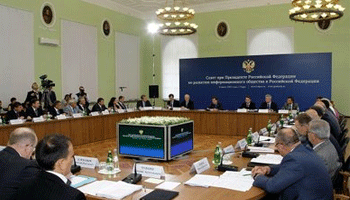 The widespread use of new technology will ensure, in particular, equal access to state services for all Russians and will significantly improve the service itself in many areas, such as education, healthcare and culture.
The widespread use of new technology will ensure, in particular, equal access to state services for all Russians and will significantly improve the service itself in many areas, such as education, healthcare and culture.
Speaking of e-government, the President stressed that it is not limited to obtaining an application form online, but is an opportunity to be granted a comprehensive state service electronically without leaving home.
President Medvedev noted that as part of the priority national project, schools and specialised children's institutions have been equipped with up-to-date computer technology and internet access, and even though the gap between different regions has not been fully eliminated it is no longer critical. Mr Medvedev believes the introduction of electronic educational resources in the teaching process is still progressing too slowly while it is vital to provide teachers in the regions with methodological and technological support and develop further the National Final School Exam (EGE) system and distance learning.
Some regions are adopting the computerised system of patient registration and admission to hospitals and it is now possible to make an appointment with a doctor online, but on the whole there is no systematic implementation of new technologies in healthcare, Dmitry Medvedev stressed. He particularly emphasised the importance of telemedicine for remote areas and a special attention to be paid to equipping emergency departments with modern systems of incoming calls processing.
Speaking about culture, the President said that level of technological equipment in most of the major regional libraries is rather high, however it remains extremely low in local libraries which should be a point of a special concern. Establishment of a national digital library, digitisation of museum collections and access to them online are also proceeding at a slow and uneven pace, the President noted, stressing the need to use a consolidated technology in this process.
The speakers at the meeting included heads of the Council's interagency working groups: Education and Science Minister Andrei Fursenko, Healthcare and Social Development Minister Tatyana Golikova, Culture Minister Alexander Avdeyev.
For further information, please visit:
http://eng.kremlin.ru